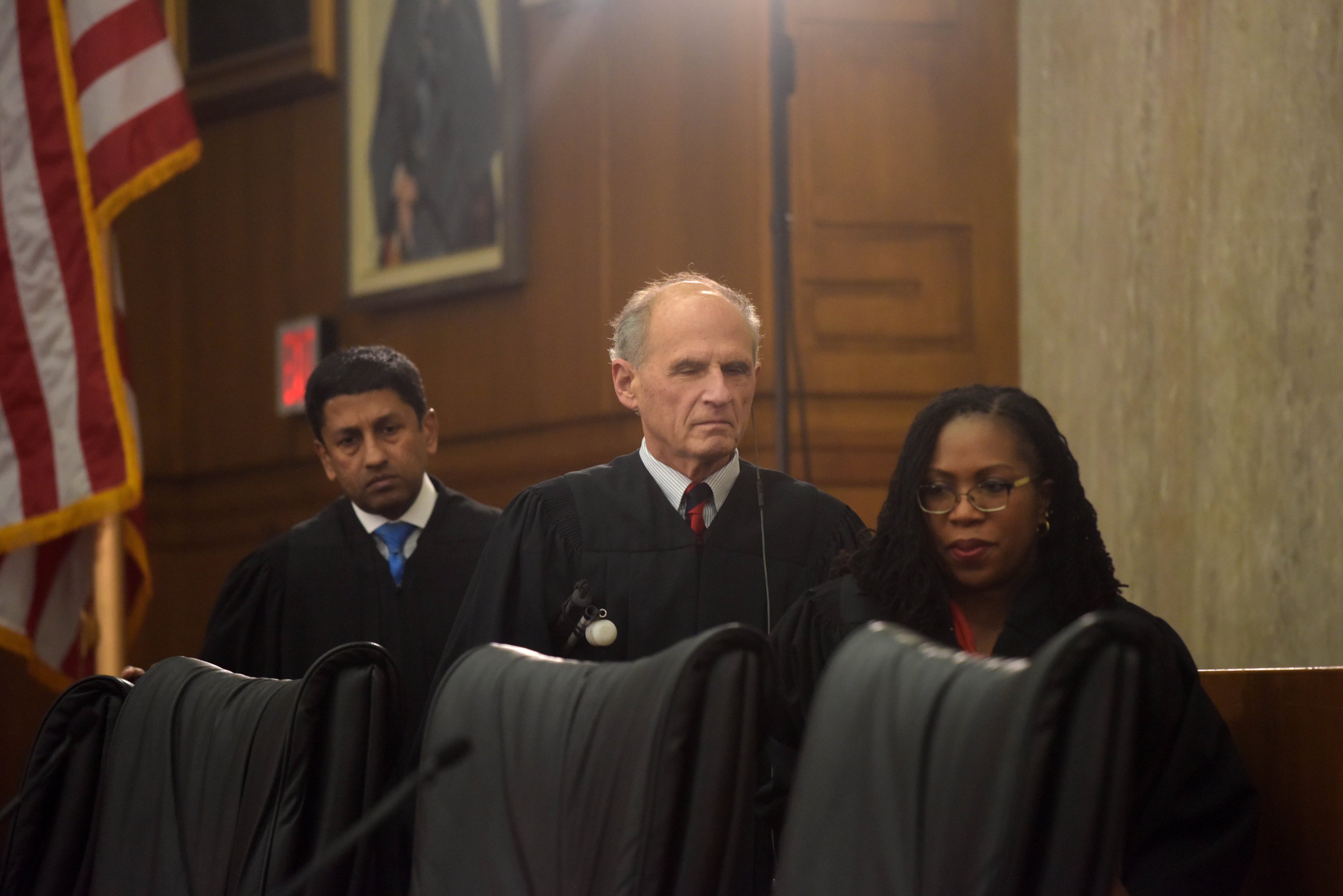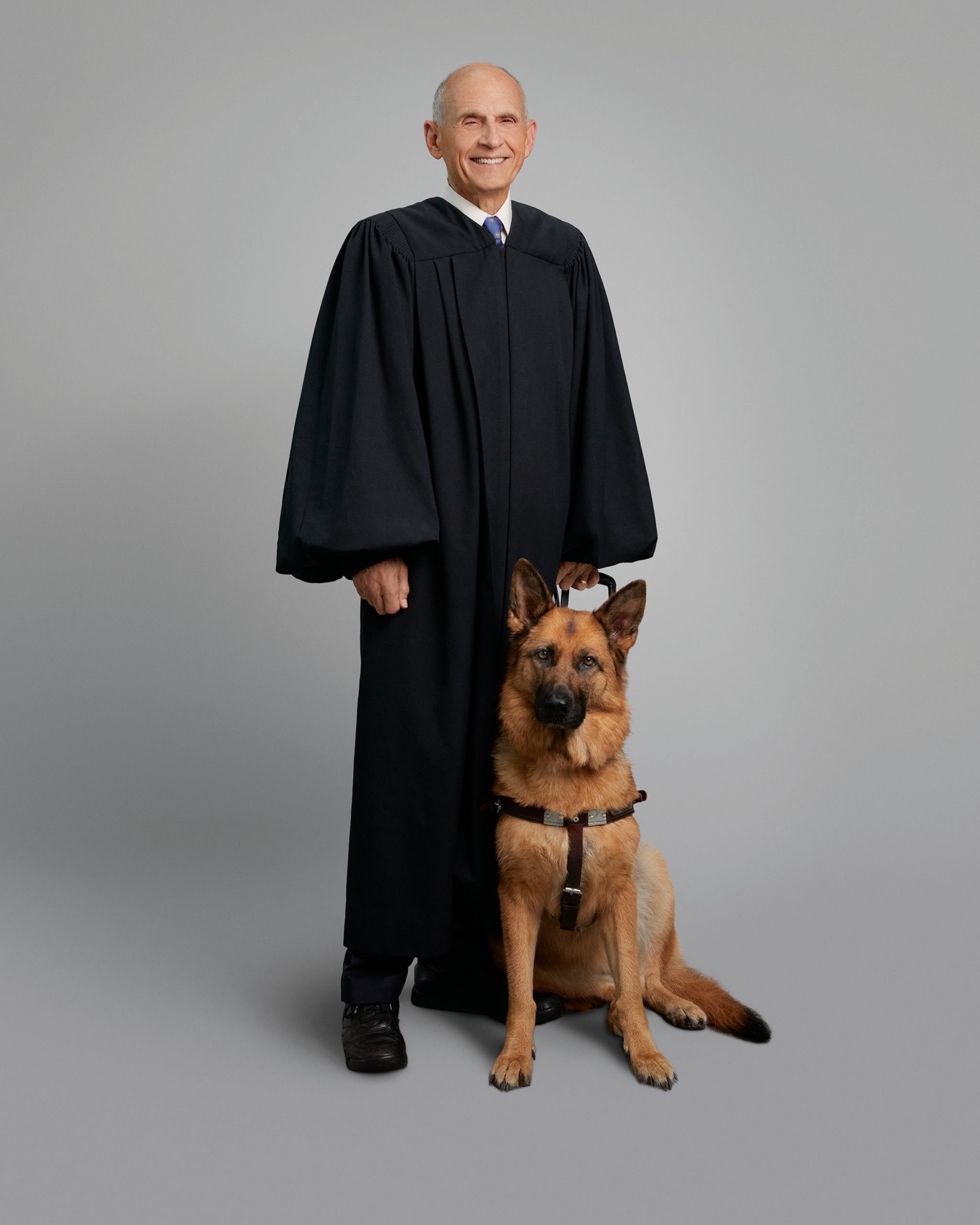For decades, David Tatel, a former federal judge on the DC Circuit Court, worked to conceal something significant about himself: He is blind. Once a sighted person who lost his vision early in his career, the lawyer and civil-rights champion developed stealthy workarounds to initially hide or downplay his lack of sight—from using the clicking sounds of a colleague’s heels in navigating a building to asking communications offices not to mention his blindness in press releases. But in his new memoir, Vision, he candidly discusses what he’s experienced. “Only now, in my eighties and in writing this memoir, have I finally come to accept my blindness as an essential part of who I am,” writes Tatel, who lives with his wife in rural Virginia.
That newfound acceptance comes in part from the four-legged sidekick gracing the cover of his book. Vixen, a seven-year-old German shepherd, is Tatel’s first-ever guide dog, who came into his life about five years ago. He credits her with helping him feel more comfortable talking about his blindness.
Tatel, at one time a strong contender for the Supreme Court, also uses the book to share his growing fears about the future of the nation’s highest court, as well as other legal issues. After a judicial career spent restraining his personal opinions, he has a lot to say.
There’s a sign on your desk that says “Ask me about my dog,” so I figure that’s a good place to start. How is Vixen doing?
[Laughs.] Vixen’s doing great. As you know, the last chapter in the book is called “The Dog That Changed My Life,” and that is not an overstatement.
I was surprised to read that you weren’t a big dog person prior to getting Vixen.
I’m as surprised as everybody. I had been told by people that a guide dog would do dramatic things for you in terms of promoting and improving your independence. What I didn’t know was how emotionally connected I would become to the dog. I think that’s partially—or maybe completely—because when the dog arrives, it’s absolutely critical to the effectiveness of the process that the dog bond with the person quickly and completely.
For the first three months, nobody else was allowed to use her name. [My wife] was only allowed to pat her once a day. She was my responsibility. Suddenly for 24 hours a day, seven days a week, I was with a dog and taking care of a dog. I think the bonding process worked both ways. I have become totally attached to this wonderful creature. It’s a very emotional connection.
I don’t think we come close to understanding how, not just intelligent, but also intuitive these dogs are. Vixen’s highly trained, but a lot of what she does isn’t from training. It’s from her learning and adjusting to a situation and solving problems. It’s really quite extraordinary.
Early in your career, you went to great lengths to hide your blindness from others, to the point that it seemed to be a source of shame for you. Where do you think that came from?
I’ve asked myself that a lot. I think the most obvious one is that when you’re a teenager, who wants to be different from their friends? I was embarrassed. As I went off to college and law school, I believed that my career would be adversely affected if people knew I had a visual disability and might someday go blind.
Maybe life would have been different for me if there had been a blind federal judge who I could have looked at and said, “Gee, I can do that,” or if there had been blind partners in law firms. But from where I looked out in my early twenties, there wasn’t any of that.
What finally helped you open up?
Once I started using the cane in my thirties, I became more comfortable with blindness, but I still didn’t want to talk about it. It was still something I downplayed. But getting Vixen was a remarkable step for me, because when you have a guide dog, you are obviously blind. It’s nothing you can hide. And unlike with a cane, people want to talk to you about the dog and how you work with the dog. I got Vixen maybe a year before I made the final decision to write the book, and I actually do think that Vixen helped me make the decision.
Doing interviews for the book, has it been hard talking about your blindness?
Absolutely. One of the reasons I didn’t want to write this book was because I didn’t want to do that. It’s hard. But it’s getting better, and I’m doing it for a reason, which is I want my book to change the way people think about blindness. If there are young people, young lawyers, who read this book and think they can do it, that’s great. Even more important is if there’s sighted people—partners in law firms and heads of agencies—who read this book and say, you know, if we have a blind applicant, we should hire that person.

Let’s talk about your law career. You’ve been described as a political progressive but a judicial conservative. Could you break down what that means?
I think government, when led by people of good faith, can improve the lives of the American people. I’m a big believer in that, so I’m a political progressive. But I’ve not let that directly influence my judging. I’ve tried as hard as I can, in my 30 years, to confine myself to the tools of judging. If I were in the Senate, I would behave very differently.
In college, you had a professor who taught you that the role of the courts was to “protect the individual from the Leviathan of government and to protect minorities against oppression.” At the same time, you strongly believe in judicial restraint–that it’s the judge’s job to uphold the law, not decide whether it’s good or bad. Was it difficult balancing these two philosophies? I could imagine them butting heads.
I actually didn’t find that they did butt heads. They work together. In fact, I believe that the ability of the courts to protect individual rights depends on judicial restraint. In other words, the courts need to husband their power and use it only when absolutely necessary to protect individual rights in the Constitution. If they do that, then the courts will have the public respect they need to issue decisions that might be unpopular but are needed to protect individual rights. I would argue that courts that have strayed from the principles of judicial restraint lose the public credibility they need to protect individual rights.
Right, and you argue that the current Supreme Court is one of those courts. What happened?
What’s happened is in the past several decades the conservative legal movement, led by primarily the Federalist Society, has done a very effective job of recruiting judges who are committed to certain policy outcomes. We now have courts that are overruling Roe v. Wade and limiting the power of the federal government. Those are two major wounds, and it’s been the Federalist Society that has very effectively helped several Republican administrations select judges who are committed to those goals. From where the public sits, the court looks and acts much more politically than it ever has before.
You point out that courts only have power because we’ve agreed as a society that they do. With public view of the courts falling so low, what do you fear could happen?
It’s very dangerous to have the public lose confidence in the courts. The court’s rulings are only effective if the public and the government accept them. The public will accept them if the decisions of the court have integrity and if the courts explain in very clear and judicial terms the basis for their decisions.
Brown v. Board is a very good example of that. Although it was deeply unpopular in the South, the public accepted it because the court explained itself in rational terms. If the public loses confidence in the courts, then it won’t accept unpopular decisions. It will weaken the ability of the courts to protect individual rights.
You write a lot about your friendship with Ruth Bader Ginsburg. You replaced her on the DC Circuit Court when she was appointed to the Supreme Court. Did watching everything that unfolded in the aftermath of her death influence your decision to retire when you did?
I’m sure they were related to each other. Justice Ginsburg was an extraordinary human being and justice, and I was a huge admirer of her. I think she made a mistake, [though] I understand why she did it. She really, really thought she’d make it. She never said this to me, but she had this idea of having her seat filled by the first woman President. Think about that: Here’s this woman who fought for gender equality her entire life, and she saw the end of her career as having the first woman President fill her seat. That’s what I think motivated Ruth Ginsburg. But she rolled the dice and lost, and the price the country has paid is just enormous.
So did that affect me? It probably did. I knew I wasn’t going to stay until I was 90 years old. I looked around the judiciary and I thought too many people stay too long. It’s not good for the courts. But it was not just [Ginsburg]. I certainly didn’t want my seat to be filled by Donald Trump, to put it in the clearest terms, and I was becoming increasingly disillusioned with the Supreme Court.
Throughout the book, you share insight into many of the court cases you were involved with over the years. I particularly liked reading about the mock cases you worked on with schoolkids, such as when you put the Big Bad Wolf from “The Three Little Pigs” on trial.
[Laughs.] They were so wonderful, and every year they acquitted the wolf. I just loved that.
What was their reasoning?
Well, they were a jury—they didn’t have to give a reasoning!
This article appears in the August 2024 issue of Washingtonian.

















